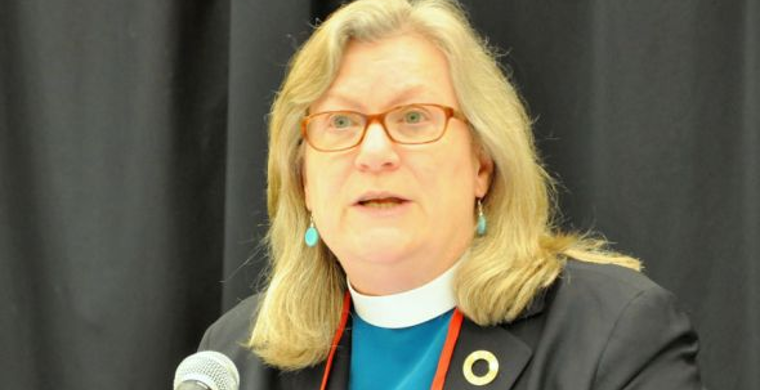SALT LAKE CITY, UT: President of the House of Deputies Repents of White Privilege, Racism at GC2015
By Michael Heidt in Salt Lake City
VOL Special Correspondent
www.virtueonline.org
June 25, 2015
During a heartfelt opening address to the 78th General Convention of the Episcopal Church (TEC), the Rev. Gay Clark Jennings, President of the Convention's House of Deputies, called on the Church to repent of "white privilege" and "racism."
During her opening address to the General Convention in Salt Lake City, Rev. Gay Clark Jennings told assembled delegates that the Episcopal Church had to look outside of itself and repent of failing to end a raft of hot-button progressive left issues, such as gun violence, discrimination, inequality, white privilege and racism.
"The church isn't the only segment of our society that's reeling right now," stated Jennings, "Our cities are besieged by gun violence and racial injustice, and too many young black men are caught in the school-to-prison pipeline." Jennings went on to say that the Episcopal Church is complicit in this, "We did not do enough to right the wrongs of discrimination, white privilege, and inequality in the world around us. This summer, especially, we must repent of that."
For Jennings, this year's General Convention was the right place to take action towards ending injustice. "Ferguson, Cleveland, Baltimore, Charleston -- General Convention is where we Episcopalians have the ability not only to proclaim that black lives matter, but also to take concrete action toward ending racism and achieving God's dream of racial reconciliation and justice. We can do no less."
The House of Deputies' plea for church-wide repentance of racial injustice followed comments in which she questioned the identity of the Episcopal Church, claiming that the denomination was "standing on a boundary," with its members "unsure of who we are."
"Just like Zechariah," said Jennings, "We are standing on a boundary between the old and the new. Gathering here to wrestle with the future of our beloved Episcopal Church, we are standing on holy ground, straining to hear God speaking above all the noise. And we are not quite sure who we are."
However, Jennings believed that this state of uncertainty represented an opportunity to discern what she called "the rise of the new within ourselves." Quoting the once popular liberal Protestant theologian, Paul Tillich, the President of the House of Deputies suggested that the "new" could be found in what she described as the neglected "corners of our souls." She went on to question the content of the Episcopal Church's soul, asking, "What will we find there, in the corners of the collective soul of the Episcopal Church?"
In answer to this, Jennings singled out the Episcopal Church's Baptismal Covenant, in which those baptized promise to "respect the dignity of every human being," stressing that this promise applied to everyone, without exception. "All of them," she said, "Not just the ones with orthodox theology, or any theology; not just the ones who make us comfortable; not just the ones whose understanding of marriage or access to communion or the calendar of commemorations accord with our seminary training or our bishop's direction."
She went on to imply that inclusion was central to the Episcopal Church's history and identity, stating, "I think we'll find our history of seeking the kingdom of God by distributing authority among clergy, bishops and laypeople so that all voices are heard, all people are welcome, and all visions of justice and mercy are honored."
Jennings suggested that church structures would have to change in order to accommodate her inclusive vision.
"We are talking," she said, "About the fate of the governance structures through which we have progressed--sometimes haltingly, sometimes kicking and screaming--toward equality for people of color, for women, and for lesbian, gay, bisexual and transgender Christians. We're talking about the shared leadership by which we have achieved our prophetic stands on the death penalty--which we have stood against as a church since 1956--on racism, gun safety and poverty, and the enormous amount of work we still have to do. We're talking about the fact that our governance structures gave many of us a seat at the table for the very first time, but that when we sat down, some of our brothers and sisters stood up and left."
Gay Clark Jennings was not exaggerating. Since 2003, when the Episcopal Church consecrated the world's first openly gay bishop, V. Gene Robinson, TEC's Sunday attendance has declined by over 200,000 people, 5 dioceses have left the denomination and, by some estimates, over $40 million has been spent litigating against traditionalists who have "stood up and left."
How many Episcopalians will be left to repent of the sins of white privilege, inequality, gun violence and racism remains to be seen.
END














